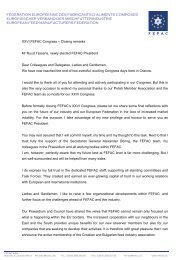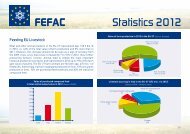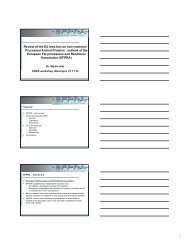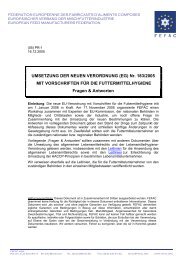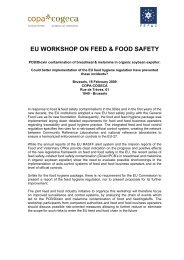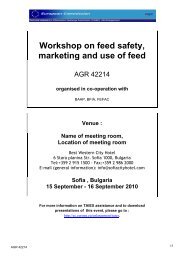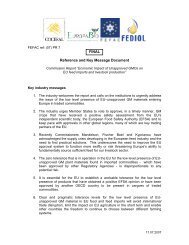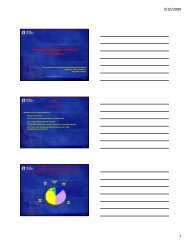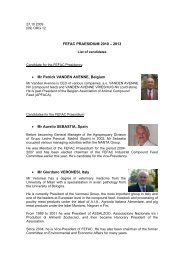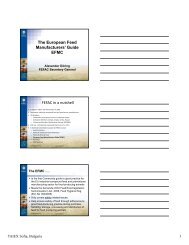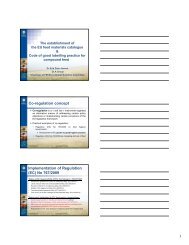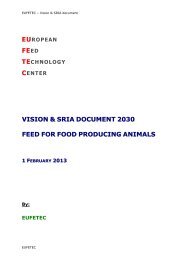Brochure (PDF) - Fefac
Brochure (PDF) - Fefac
Brochure (PDF) - Fefac
You also want an ePaper? Increase the reach of your titles
YUMPU automatically turns print PDFs into web optimized ePapers that Google loves.
Foreword<br />
Winds of change – in the feed industry too<br />
Some say that the<br />
50 th Anniversary<br />
is the time<br />
when the “age<br />
of reason” sets<br />
in. I sincerely<br />
hope that this<br />
sentiment is fully<br />
shared by all<br />
our Members,<br />
market partners<br />
and political decision-makers when<br />
commemorating the 50 th Anniversary<br />
of FEFAC, our European Feed Industry<br />
Federation. In times of turmoil on the<br />
financial markets, nothing is more<br />
required than a “cool head and good,<br />
fact-based judgment” to overcome<br />
the current crisis of confidence in the<br />
short-term and long-term viability<br />
of our free-market-based economic<br />
systems.<br />
The “good news” for our sector is<br />
that due to the financial debacle of<br />
bank institutions, our politicians are<br />
recognizing the value of investment<br />
in agriculture. We should say<br />
“welcome back” to the real economy,<br />
reminding them that the feed &<br />
food industry is producing essential<br />
goods for livestock farmers who<br />
are producing meat, eggs and dairy<br />
products at very competitive prices.<br />
It is encouraging to see that our<br />
global leaders have agreed at the<br />
last G8 Summit in L’ Aquila on the<br />
importance of assuring an affordable<br />
supply of nutritious foodstuffs to the<br />
growing world population injecting<br />
20 bio. USD in rural economies in the<br />
developing world.<br />
Productivity and profitability<br />
I believe that this is the right time for<br />
EU decision-makers to review the<br />
policies affecting the competitiveness<br />
and sustainability of our agro-food<br />
industry. The G8 Farm Ministers<br />
already highlighted in their<br />
declaration at the meeting in April<br />
2009 on global food security how<br />
important it is to rethink our<br />
agricultural models at global level<br />
and underlined the need to develop<br />
partnerships with the private sector<br />
to meet the goals laid down in the UN<br />
Millennium Declaration on global food<br />
security. The EU High Level Group<br />
on the Competitiveness of the<br />
Agro-Food Industry has come<br />
forward with a set of well-defined<br />
practical recommendations on how<br />
to stimulate the productivity and<br />
profitability of our farming and food<br />
sector in order to exploit its full<br />
potential to contribute to growth in<br />
jobs while strengthening global food<br />
security.<br />
Ecological intensification<br />
The global debate on securing food<br />
supplies for the world population<br />
and the impacts of climate change<br />
on food production will have a major<br />
influence on political frameworks<br />
for the livestock sector in the EU<br />
in coming years too. The European<br />
Commission White Paper on climate<br />
change published in April 2009 already<br />
contains a “catalogue of solutions”<br />
aiming at launching the adaptation<br />
of European agriculture to the<br />
climate change. I am convinced that<br />
the feed industry has already been<br />
making a considerable contribution<br />
to improving efficiency in the livestock<br />
sector for many years now. All the<br />
livestock farming experts agree,<br />
however, that the challenge of further<br />
ecological intensification of animal<br />
production must be accepted by all<br />
partners and can only be tackled<br />
successfully by applying the latest<br />
I believe … that man will not completely perish as long as others remember<br />
him and that the history of the future would be without shape nor meaning<br />
if it did not find its source in a past that determines and explains it.<br />
Jean d’Ormesson (1978)<br />
technologies with full consideration<br />
given to animal welfare requirements.<br />
The indispensable “winds of change”<br />
within the sector with all its challenges<br />
are already becoming evident and<br />
demand action from all involved.<br />
Science‑based approach<br />
FEFAC is a founder member of<br />
the Round Table of the entire<br />
EU food chain, including agro-supply<br />
industries, farmers, food processors,<br />
the packaging industry and retailers<br />
on the subject of sustainable<br />
production and consumption. This<br />
initiative enjoys active support by<br />
the European Commission, who<br />
offered to co-chair the Round Table<br />
to facilitate the development of a<br />
science-based approach. With a view<br />
to the Copenhagen Conference on<br />
Climate Change in December 2009,<br />
I am proud to say that the FEFAC<br />
Council agreed to fully collaborate in<br />
the new initiative, which confirms my<br />
conviction that indeed our industry<br />
has entered the “age of reason” as<br />
a very mature, highly competitive<br />
industry, and truly innovative in<br />
finding solutions to problems of our<br />
livestock customers and our society<br />
at large.<br />
By Pedro Corrêa de Barros,<br />
FEFAC President<br />
5




